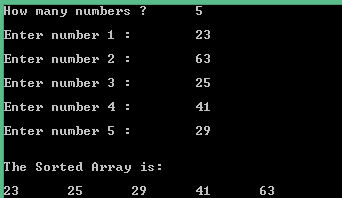Queue is a data structure , similar to
Stack , but here in queue we have openings at both the ends , one for insertion and other for deletion.
Some of the common operations of queue are :
- Adding an item to queue(enqueue)
- Removing an item from a queue(dequeue)
- Overflow Condition(Queue full)
- Underflow Condition(Queue empty)
- Getting the front element(peek)
|
|
Overflow situation occur when the queue is full and then we are trying to insert/add another item to the queue .
Underflow situation occur when the queue is empty and the we are trying to remove/delete an item from the queue.
The principle of queue is First In First Out (FIFO).
Download codePROGRAM :
#include <iostream>
using namespace std;
int main()
{
int rear = -1,front = -1,item,MAX ,choice ,i;
cout << "Enter Size of Queue : \t ";
cin >> MAX;
int QueueArray[MAX];
while (1)
{
cout << "\nQueue Operations :";
cout << "\n1. Insert/Add";
cout << "\n2. Remove/Delete";
cout << "\n3. Peek/Front item";
cout << "\n4. Display Queue";
cout << "\n5. Exit";
cout << "\nEnter your choice :\t";
cin >> choice;
switch (choice)
{
case 1:
if (rear == MAX - 1)
{
cout << "Queue Overflow \n";
}
else
{
if (front == -1)
{
front = 0;
}
cout << "Inset the element in queue : \t";
cin >> item;
rear = rear + 1;
QueueArray[rear] = item;
}
break;
case 2:
if (front == -1 || front > rear)
{
cout << "Queue Underflow \n";
break;
}
else
{
cout << "Element deleted from queue is " << QueueArray[front] << "\n" ;
front = front + 1;
}
break;
case 3:
if (front == -1 || front > rear)
{
cout << "Queue Underflow \n";
break;
}
else
{
cout << "The front element is :" << QueueArray[front] << "\t" ;
}
break;
case 4:
if (front == -1 || front > rear)
{
cout << "Queue Underflow \n";
break;
}
else
{
cout << "The current elements in queue are :";
for (i = front; i <= rear; i++)
{
cout << QueueArray[i];
}
}
break;
case 5:
return 0;
break;
default:
cout << "Wrong Entry \n ";
break;
}
}
return 0;
}
Download codeOUTPUT :
 |
| Cpp - Queue Operations |
 |
| Cpp- Queue Overflow |
 |
| Cpp - Queue Underflow |






























